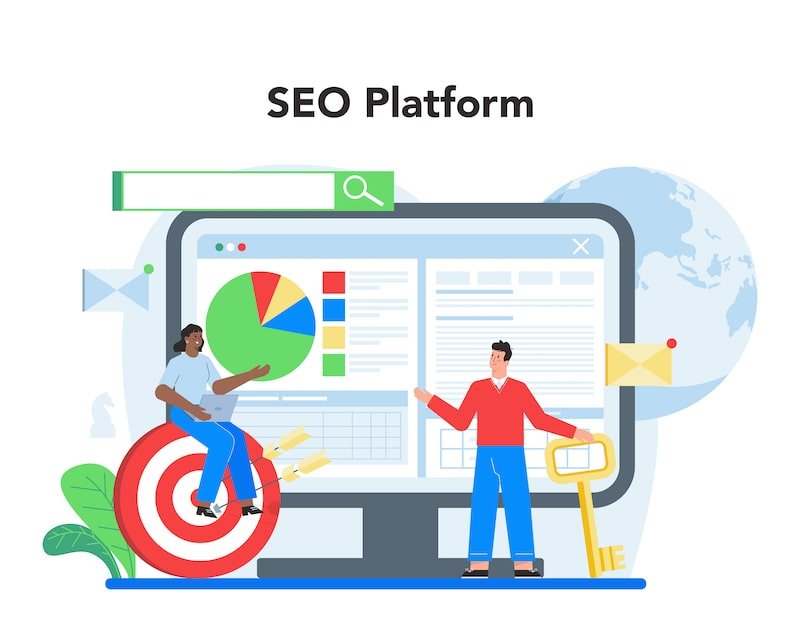
In today’s digital world, having an online presence is crucial for any business looking to reach new customers and grow their brand. However, simply having a website is no longer enough. To truly thrive online, it’s essential to optimize your website for search engines like Google.
Proper search engine optimization (SEO) can lead to increased organic website traffic, higher rankings on search engines, and more conversions and sales. By making your website easy for both search engine bots and human visitors to navigate and digest, you can dramatically boost your site’s visibility and authority.
The purpose of this comprehensive guide is to provide businesses with the knowledge and strategies needed to achieve effective SEO optimization. We will cover all of the key elements of on-page and off-page optimization, as well as advanced techniques to take your SEO to the next level.
With the right implementation of these SEO best practices, you can gain significant improvements in your website’s search engine rankings and traffic. The time to start optimizing is now!
Understanding SEO Optimization
Before diving into strategies, it’s important to have a clear understanding of what exactly SEO optimization entails.
SEO stands for search engine optimization. It is the process of improving a website to increase its visibility and rankings in the organic, unpaid search results on search engines like Google, Bing, and Yahoo.
The better optimized a site is, the higher it will rank in search results for keywords and phrases relevant to its content. Higher search rankings allow sites to reach more of their target audience and gain increased web traffic.
How Search Engines Work
To appreciate SEO, it helps to know how search engines like Google work under the hood.
Google relies on computer programs called crawlers or spiders to browse and index the internet. These bots crawl through web pages, collecting information to be processed by Google’s algorithms.
The algorithms analyze and rank web pages based on hundreds of ranking factors, with the most critical being:
- Relevance to keyword/search query
- Authority and trustworthiness
- Technical SEO components
- Quality backlink profile
By optimizing for these key factors, you can improve your site’s search rankings.
The Importance of Keywords
At the core of SEO is keyword optimization. Keywords and phrases are what users type into search bars to find information online.
To rank for a term, your content must be relevant to that keyword so search engines know what your page is about. Including keywords naturally throughout your website helps search bots understand your content’s topic.
Researching high-traffic, low-competition keywords that relate to your products or services is key to an effective SEO strategy.
Types of SEO
There are several categories of SEO to focus on:
- On-page SEO: Optimizing individual web pages with titles, content, etc.
- Off-page SEO: Earning backlinks and mentions to build domain authority.
- Technical SEO: Ensuring site architecture, speed and mobility are optimized.
- Local SEO: Optimizing for local searches by customers in your geographic area.
Now let’s explore each of these in more detail.
On-Page SEO Optimization
On-page SEO refers to optimizing elements directly on individual web pages. This includes your website’s:
Title Tags
The <title> tag appears in the browser tab and is the first signal to search engines about your page’s topic. Keywords can naturally be worked into title tags so they accurately describe each page’s content.
Meta Descriptions
The meta description provides a short summary of the page in search results. Accurately summarizing the page and including keywords help get clicks.
Header Tags
Header tags (<H1>, <H2>, <H3>) organize page content into logical sections. <H1> tags should contain your target keyword and establish the topic. Lower-level headers break up sections.
Content Optimization
Your page’s body content should include keywords naturally and provide useful information. Craft compelling content that encourages visitors to spend time on your site.
Image Optimization
Optimize images by including keywords in file names, alt text descriptions, title tags, etc. This improves image SEO.
Internal Linking
Linking between related pages passes “link juice” to help search bots index your site. Ensure links use keywords as the anchor text.
In general:
- Focus on creating useful, engaging content rather than cramming in keywords.
- Maintain a natural keyword density of 1-2% throughout page content.
- Ensure your page is mobile-friendly and uses responsive design.
- Include multimedia like videos, infographics and images to improve user experience.
- Use keywords in URLs whenever possible.
Proper on-page optimization is key for ranking well organically in search results.
Technical SEO Optimization
Beyond on-page factors directly related to content, there are important technical website elements to optimize as part of SEO.
Website Architecture
Ensure your site architecture is simple, logical and easy for bots to crawl. Limit the click depth and avoid complex nested subfolders.
URL Structure
URLs should be short, simple and keyword-optimized. Avoid overly long URLs with unnecessary parameters.
Website Speed
Site speed greatly impacts SEO and user experience. Optimizing page load speed with caching, compression, etc. is essential.
SSL Certificates and HTTPS
Switching to HTTPS encrypted connections and SSL certificates provides a security boost that boosts SEO rankings.
Mobile Optimization
With mobile usage growing, having a responsive mobile site is critical for ranking well and providing user satisfaction.
Accessibility
Your site should be optimized for accessibility standards to accommodate all users and comply with legal requirements.
Performing regular website audits and crawl tests helps spot any technical SEO issues to address. Tackling these areas ensures your site provides the best possible user experience.
Off-Page SEO Optimization
While on-page and technical SEO establishes the foundation, off-page optimization is also crucial for rankings. Off-page factors include:
Link Building
One of the most powerful ranking factors is earning high-quality backlinks from other authoritative sites. This helps demonstrate your site’s credibility.
Social Signals
Having content shared socially on sites like Facebook, Twitter, LinkedIn, etc. can boost your site’s authority.
Reviews and Ratings
Positive online reviews on sites like Yelp and industry-specific directories improve local SEO and reputation.
Guest Blogging
Publishing articles on industry websites helps build contextual backlinks and establishes you as an authority.
Influencer Marketing
Partnering with influencers in your niche to promote your brand also earns valuable backlinks from authoritative sites.
The key is to build a diversified link profile from reputable sites with content relevant to yours. Avoid low-quality links from spammy or irrelevant sites which can actually damage SEO.
Local SEO Optimization
For businesses operating locally, optimizing for local SEO is critical to be found by nearby customers. Key elements include:
Google My Business
Claiming and optimizing your Google My Business listing helps you rank locally.
Local Citations
Earning mentions on directory sites like Yelp helps establish your local presence.
Local Content
Creating location-specific content with city and neighborhood keywords targets local searches.
Local Link Building
Earning backlinks from local sites gives a strong local SEO boost. Sponsor local events, sports teams etc.
Optimizing your Google My Business page and earning local citations should be top priorities. Encouraging customer reviews builds credibility. Then target local link building opportunities.
Advanced SEO Techniques
Rounding out your optimization strategy, advanced techniques like the following further enhance on-page and off-page SEO:
Schema Markup
Adding schema markup to your site enhances how search engines interpret and display your content.
Accelerated Mobile Pages (AMP)
Creating fast-loading AMP versions of content improves mobile user experience.
Progressive Web Apps (PWAs)
PWAs allow users to install your website as an app on their device for easy access.
Voice Search Optimization
Optimizing content for voice queries from AI assistants like Alexa allows tapping into voice search.
As search engine algorithms and technology progresses, it’s important to stay on top of emerging trends and leverage new techniques to stay ahead of the competition.
Conclusion
I hope this comprehensive guide provided you with a thorough overview of how to optimize your website for search engines in 2023 and beyond.
Proper SEO implementation requires an understanding of both on-page and off-page optimization best practices. By leveraging the strategies outlined here related to keywords, content, backlinks, speed, and more, you can elevate your web presence and gain increased organic search traffic.
Don’t leave your website’s visibility to chance. Follow these SEO tips and start climbing the search rankings today!


